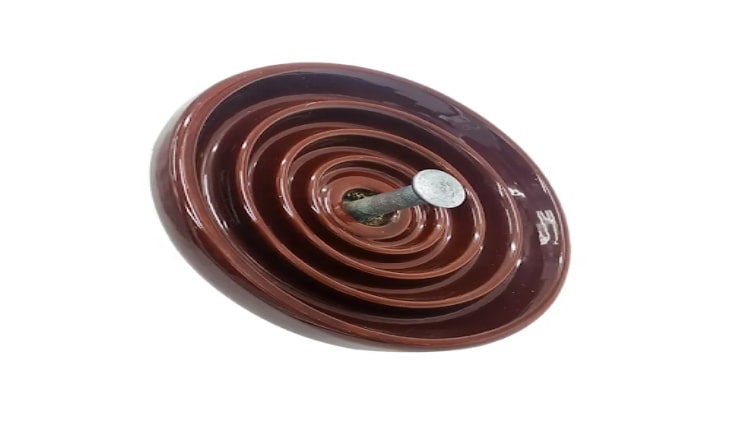11kV disc insulators are an essential component in the electrical industry, playing a crucial role in the transmission and distribution of electricity. They are designed to provide electrical insulation and support to high-voltage electrical conductors, helping to ensure the safe and efficient flow of electricity.
These disc insulators are made from high-quality materials and manufactured to strict industry standards, making them durable, reliable, and long-lasting. This blog will explore everything you need to know about disc insulators, including the available types, their advantages and disadvantages, and how to choose the best one for your application. Read on to learn more about 11kV disc insulators!
The Three Main Types of 11kV Disc Insulators
Porcelain disc insulators: Porcelain is the primary type of insulator and is widely used. It has the most decisive elements and excellent electrical properties for high-voltage applications, making porcelain a great choice. However, porcelain is also brittle and can easily crack if subjected to excessive mechanical stresses or sudden temperature changes.
Silicone rubber disc insulators: Silicon carries mechanical superiority, thus gaining much more popularity than porcelain nowadays. Silicone rubber is more flexible and durable, allowing it to withstand higher temperatures and heavier loads without breaking. However, porcelain is more electrically efficient than they are, so they are not recommended for high-voltage applications.
Composite 11kV disc insulator: This type of high-voltage electrical insulator commonly used in electrical power transmission and distribution systems. It comprises two main components; a ceramic disc and a composite insulating housing. They have good mechanical strength and electrical efficiency, making them great for high-voltage applications. Composite disc insulators are also more cost-effective than porcelain or silicone rubber.
The Advantages and Disadvantages of Each Type
Advantages of 11kV Disc Insulators
11kV disc insulators have high dielectric strength, which means they can withstand high-voltage electrical stress without breaking down. This makes them an ideal choice for use in high-voltage electrical systems.
These insulators are made from high-quality materials and manufactured to strict industry standards, making them highly resistant to mechanical stress and damage. 11kV disc insulators are known for their long service life, as they can withstand harsh environmental conditions and resist damage from UV rays, pollution, and other environmental factors.
These insulators are also compact and efficient, making them ideal for use in limited-space environments such as substations and switchgear. 11kV disc insulators are an economical choice for electrical insulation, as they are relatively inexpensive compared to other electrical insulators.
Disadvantages of 11kV Disc Insulators
11kV disc insulators are designed for specific applications and may not be suitable for all electrical systems. These insulators are vulnerable to flashover, which is the sudden transfer of electrical current across the surface of the insulator and can lead to electrical failure.
11kV disc insulators require regular maintenance, including cleaning and inspection, to ensure they function properly. Due to their compact and lightweight design, 11kV disc insulators can be fragile and require special handling during installation and maintenance.
These are also designed to accommodate only a limited size of an electrical conductor, which may limit their use in certain applications.
How to Choose the Right 11kV Disc Insulator for Your Application
When choosing the suitable 11kV disc insulator for your application, you must consider the following characteristics depending on your specific application requirements.
Pin Type: Pin-type insulators are best for applications that require a low-profile design with minimal mechanical stress. They are generally more resistant to environmental conditions, making them an ideal choice for outdoor applications. The downside is that they have a relatively low load-bearing capacity, so they may not be suitable for higher-load applications.
Suspension Type: Suspension-type insulators are better suited for applications that require high load-bearing capacity but do not require a low-profile design. The significant advantage of this type of disc insulator is that it can support large amounts of weight, so it is perfect for applications with heavy loads. However, due to their larger size, they may not be suitable for smaller spaces or applications with limited space.
Post Type: Post-type insulators are ideal for applications that require a low-profile design and high load-bearing capacity. They are usually made from porcelain and feature a single attachment point, making them durable and reliable. However, due to their design, they can be more challenging to install and maintain than other types of disc insulators.
Conclusion
11kV disc insulators are a vital component in the electrical industry, which is crucial in ensuring the safe and efficient transmission and distribution of electricity. With their high dielectric strength, mechanical strength, and durable design, these insulators are an economical and reliable choice for electrical insulation.
Despite their limitations and disadvantages, these insulators are an important and valuable asset in the electrical industry. They will continue to play a significant role in the future of electrical power systems. With a better understanding of 11kV disc insulators, you can now appreciate their critical role in the safe and efficient operation of high-voltage electrical systems.

